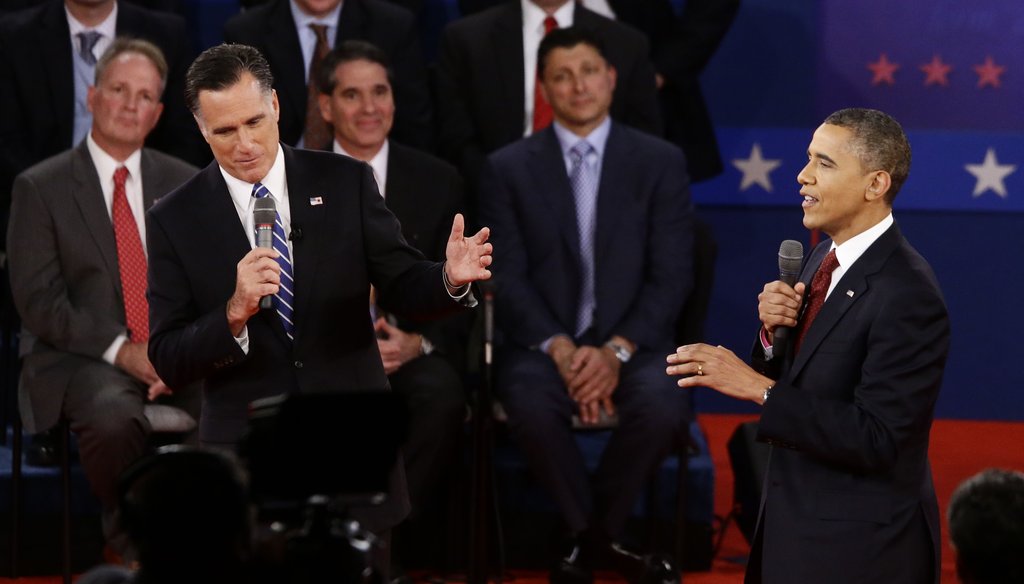Stand up for the facts!
Our only agenda is to publish the truth so you can be an informed participant in democracy.
We need your help.
I would like to contribute

Republican presidential nominee Mitt Romney (left) and President Barack Obama (right) mix it up during the Oct. 16, 2012, debate in New York.
The 2010 Patient Protection and Affordable Care Act, often called Obamacare, has stirred plenty of emotions and truth-twisting by its supporters and critics.
Below are some abbreviated versions of fact checks of statements about it by President Barack Obama and Republican presidential nominee Mitt Romney during the campaign. Look for the complete fact checks at the PolitiFact online sites.
Readers can comment on our Truth-O-Meter rulings at our Facebook page: www.facebook.com/politifact.georgia?fref=ts. And they can follow us on Twitter at: PolitiFactGA.
Obama: Says 50 million people would lose their health insurance if Obamacare is repealed.
Obama made this claim during the first presidential debate in Denver to defend the health care law.
That figure is based on projections for a decade down the road, and it applies to people who don't have insurance now. If Romney repeals the health care law, as he has vowed to do if elected, some of those people will not have actually gotten coverage.
Obama’s health care law seeks health coverage for every American by requiring most Americans to obtain coverage or face a fine. To help people meet that requirement, it expands Medicaid for the poor, provides subsidies for people of modest means to buy insurance and requires businesses to provide employee insurance. It also creates exchanges where individuals and businesses can purchase private policies.
Only about 30 million to 32.9 million people would lose coverage by 2022 if Obamacare was simply repealed, research shows. An additional 18 million people might lose coverage if Romney achieves his plan of converting Medicaid to a block grant, according to some studies. The estimate, however, includes people who don’t have insurance now.
Obama’s number assumes the worst about the possible effect of Romney’s plan. Obama is right that repealing the health care law will result in millions losing coverage, but his statement is an oversimplification of long-term projections and includes more than just a simple repeal of the 2010 law.
On balance, PolitiFact rated Obama’s statement Mostly False.
www.politifact.com/truth-o-meter/statements/2012/oct/05/barack-obama/obama-says-50-million-lose-coverage-if-obamacare-r/
Romney: " ‘Obamacare’ puts the federal government between you and your doctor."
Romney said this after the U.S. Supreme Court announced its ruling in late June that upheld the foundation of the health care law.
The Romney campaign didn’t respond to PolitiFact’s request for information to back up the claim.
PolitiFact found many provisions that support an open process geared toward providing better care and some concerns that government influence over the private insurance market will dictate doctor behavior.
Primary care doctors seem most inclined to support the law, as do a large number of physician professional associations.
Support for the law is weaker among specialists, who are more likely to question what it means for their compensation and more likely to face scrutiny for using high-cost tests and procedures. But that doesn’t mean the government is placing itself between doctors and patients. The law is complex, but it leaves intact the private sector delivery of health care.
Romney’s statement overstates the level of government control in the law and ignores state flexibility in setting insurance standards.
PolitiFact rated it False.
www.politifact.com/truth-o-meter/statements/2012/jul/09/mitt-romney/health-law-puts-government-between-patients-and-do/
Sign up for PolitiFact texts
Obama: Because of the new health care law, "Americans no longer will see their coverage dropped or capped when illness strikes."
In March, the Obama campaign released a 17-minute film that included this claim.
Beginning in January 2014, the law is scheduled to prohibit individual and group health plans from placing annual limits on the dollar value of coverage.
It’s worth noting that the number of people who experienced revocations of their insurance was quite small. One study found that in the five-year period from 2004 to 2008, the annual number of rescinded policies averaged 5,449 per year, ranging from a high of 7,004 in 2005 to a low of 4,818 in 2007. To put this in perspective, 28.5 million people in 2008 had individually purchased insurance -- the only kind for which people had to worry about getting their insurance revoked -- while 202.6 million had private insurance of any type, U.S. Census Bureau data shows.
The law, though, doesn’t explicitly stop companies from imposing limits on the number of visits to doctors, physical therapists and the like.
The claim in the film is largely accurate that Obama’s health care law makes it all but impossible for health insurers to revoke their beneficiaries’ policies for anything short of willful fraudulence.
PolitiFact rated the statement Mostly True.
www.politifact.com/truth-o-meter/statements/2012/mar/19/barack-obama/film-promoting-barack-obama-claims-new-law-ensures/
Romney: The Supreme Court said the individual mandate "is a tax. So it's a tax."
In the days following the Supreme Court’s June 2012 decision on the health care law, supporters and critics of the law sparred over the question of whether or not the individual mandate was a tax.
"Well, the Supreme Court has the final word," Romney said. "And their final word is that Obamacare is a tax. So it's a tax."
PolitiFact received comments from 15 constitutional law experts from across the ideological spectrum. PolitiFact found a certain degree of consensus -- but also a wide range of opinions on whether Romney’s claim was worded accurately, particularly given the complexity of the court’s ruling.
The Supreme Court found the law constitutional based on Congress’ taxing authority, but nowhere in the opinion did Chief Justice John Roberts say that the individual mandate actually was a tax -- only that it "may reasonably be characterized as a tax" and that "it is reasonable to construe" it as a tax.
Most of the legal experts we interviewed said Romney was on pretty safe legal ground. The one main criticism from our experts -- that Romney went too far when he said that the Supreme Court ruled that the mandate is a tax. Several legal scholars told PolitiFact that the court ruled that the mandate acts like a tax, or is analogous to one, but not that it is one -- a small linguistic distinction, but an important legal one.
PolitiFact rated his statement Mostly True.
www.politifact.com/truth-o-meter/statements/2012/jul/05/mitt-romney/mitt-romney-says-health-care-laws-penalty-tax/
Obama: Says that under Mitt Romney, 89 million Americans could be denied coverage if they have a pre-existing condition.
How about that for a Facebook post?
The Obama Truth Team asked people to spread the word to their Facebook friends. They might want to wait before doing so.
The estimate comes from a study that looked at coverage gaps, without a focus on pre-existing conditions. Some of those 89 million could be protected in a world without the health care law. That reduces the number of people who could suffer coverage denials.
While Romney would work to repeal blanket protection for people with pre-existing conditions, the claim that he could expose 89 million to the possibility of denied coverage is only partially accurate, and leaves out important details.
PolitiFact rated it Half True.
www.politifact.com/truth-o-meter/statements/2012/sep/14/barack-obama/obama-campaign-says-89-million-americans-could-be/
Romney: "Pre-existing conditions are covered under my (health care) plan."
Romney said this during the first debate between himself and Obama on Oct. 3 in Denver.
Obama disagreed. So who’s correct?
Under Romney’s proposed plan, people would be protected from denial only if they have been continuously insured.
The health care law, though, offers protections whether people have current coverage or not, so it offers more robust protection. The law also includes a requirement that everyone have insurance or pay a tax penalty. Romney’s plan doesn’t have that requirement.
Romney did not mention the qualifier that people have to stay insured to get the protection. That’s a significant omission.
PolitiFact rated his statement Mostly False.
www.politifact.com/truth-o-meter/statements/2012/oct/05/mitt-romney/mitt-romney-says-his-health-care-plan-covers-pre-e/
Obama: Because of Obamacare, "over the last two years, health care premiums have gone up -- it's true -- but they've gone up slower than any time in the last 50 years."
Obama made this claim to rebut Romney’s argument that health care premiums would increase if the health care law is fully implemented.
Obama’s statement about historically low growth is based on a January 2012 report by the federal Centers for Medicare and Medicaid Services that found health care spending grew less in 2009 and 2010 than any time in 51 years.
But Obama got himself into trouble by saying "premiums" instead of "total health care spending."
The historical data for premiums is generally consistent with his claim, but they go back only 14 years. He also vastly exaggerated the impact of his health care law on the costs. Experts say that's due to the recession, not the law.
PolitiFact rated his claim False.
www.politifact.com/truth-o-meter/statements/2012/oct/04/barack-obama/obama-said-health-care-premiums-went-slower-any-ti/
Romney: "Under the president's plan, he cuts Medicare by $716 billion, takes that money out of the Medicare trust fund and uses it to pay for Obamacare."
The GOP nominee has spoken frequently about the math he says was necessary in order to make Obamacare work. His diagnosis this time, during an August television interview, was more nuanced.
In this instance, Romney’s claim gives the impression that the law takes money that was already allocated to Medicare and funds the new health care law with it.
The nonpartisan Congressional Budget Office looked at the years 2013 to 2022 and determined the health care law affected Medicare outlays by $716 billion.
At the time the health care law was being finalized and passed, Democrats said it was important to them that the new law not add to the deficit. So the reductions in Medicare spending were counted against the health care law’s new spending. Some new spending is within the Medicare program, such as increasing coverage for prescription drugs and offering preventive care with no out-of-pocket costs.
More significantly, though, the law moves to cover the uninsured, by giving them tax credits to buy private insurance. It also expands Medicaid, the state insurance program for the poor. The savings from Medicare offset that spending.
The law uses a number of measures to try to reduce the rapid growth of future Medicare spending. Those savings are then used to offset costs created by the law -- especially coverage for the uninsured -- so that the overall law doesn't add to the deficit.
PolitiFact rated his statement Half True.
www.politifact.com/florida/statements/2012/aug/20/mitt-romney/romney-says-obama-cuts-716-medicare-pay-obamacare/
Our Sources
See attached articles



















































